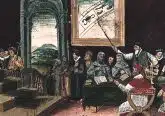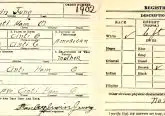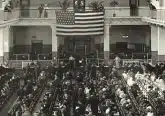The Importance of Oral Histories

Sharing a meal with loved ones over the holidays is a cherished tradition valued across cultures. It is here, at the table, that stories are told. And it’s in the shared moments when personal reflections of one’s childhood and family traditions are recounted that the wisdom of past generations is handed on to the future. It is important to write those shared stories! Genealogy is more than just facts and research—it needs the essential component of storytelling: oral history.
Storytelling can include collective memories, the shared memories of an event by communities of all sizes (from families to nations). These can be joyful, such as volunteering at a soup kitchen, celebrating a wedding or even experiencing the Holy Land.
The memories can also be tragic, such as the impact of 9/11 on American society, the devastation of WWII and, more recently, the effects of Hurricanes Helene and Milton.
One of the best examples of storytelling and collective memories is the Bible, especially the New Testament as told by Jesus’ first followers. “The Bible … is literally the number one bestseller of books for all human history. It is the grounding text of our Catholic faith,” wrote Brian Strassburger, SJ, in the Jesuit Post.
HOW TO ACQUIRE AN ORAL HISTORY.
Older relatives are historical treasures— get their stories before they are lost! Ask about their childhood, their parents, their grandparents and even their great- grandparents. Was the Mass said in Latin when they were children? How did they celebrate the holidays? What did they and their friends do for fun? If they show you photographs, ask where they were taken and the names of and relationship to people in them.
RECORD THE INTERVIEW.
If possible and with your relative’s permission, interview on video or audio to simplify taking notes. However, be sure to transcribe the recorded interview later.
QUESTIONS THAT CAN FILL IN THE GAPS.
Toward the end of the interview, ask your relative to fill in the gaps of your personal knowledge of family members. Are there old documents, such as a marriage certificate or a naturalization paper, that can be copied? Is there an old family Bible? The family history written in the front of Bibles often goes back many generations.
WHO IS THE OLDEST MEMBER OF THE FAMILY THE RELATIVE BEING INTERVIEWED CAN RECALL?
Did the interviewee experience the Influenza of 1918 or fight in the American Civil War? Ernest Hemingway once said: “Every man has two deaths – when he is buried in the ground and when the last time someone says his name.” This emphasizes the importance of legacy and remembrance.
For help in developing interview questions, check out the Family History Daily, which offers a free printable list: “100 Questions Every Family Historian Should Ask Their Relatives.”
The University of California Los Angeles Library Center for Oral History Research also offers examples of questions with their family history sample outline.
BEYOND ORAL HISTORIES.
Many people in the 18th and 19th centuries believed it was an unattractive vanity to talk about themselves and thus wrote their lives’ mundane details in diaries. Letters were also an important means of recording details about a person’s life.
And recall that The Catholic Telegraph has an abundance of national and worldwide news. Its first 100 years are digitized at The Catholic News Archive (1831-1930) and the Public Library of Cincinnati and Hamilton County (1847-2012). The University of Dayton retains histories from many parishes in Dayton, OH, and the surrounding communities and makes these available online through its Parish Histories Collection.
NEXT UP: Calendar Transitions and Double Dates!
 Ruthy Trusler is a communication consultant with a passion for genealogy. For over 20 years, she has helped families document their ancestry and write their family legacies.
Ruthy Trusler is a communication consultant with a passion for genealogy. For over 20 years, she has helped families document their ancestry and write their family legacies.
This article appeared in the December 2024 edition of The Catholic Telegraph Magazine. For your complimentary subscription, click here.













